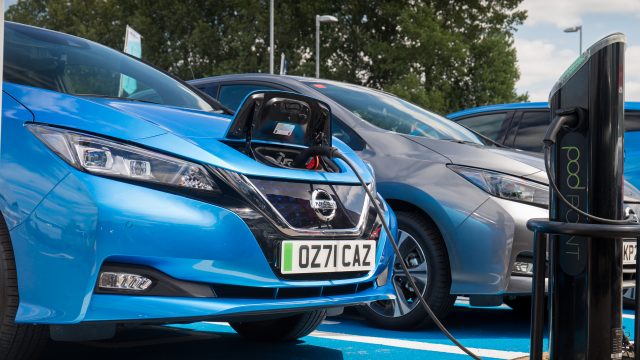Battery-electric vehicles outnumber plug-in hybrids on UK roads for the first time.
That’s according to analysis of SMMT data by the RAC, which today (Oct 8) hailed the findings as a major milestone on the transition to zero-emission driving.
It estimates there are now 332,299 battery-electric vehicles (BEVs) versus 327,183 plug-in hybrids (PHEVs).
BEVs now represent more than half (50.4 per cent) of all plug-in cars on the UK’s roads since 2010 – up from 46.3 per cent at the same time last year.
In 2010, the SMMT’s new registration figures showed there were 167 BEVs and 21 PHEVs.
It follows the highest single month of new BEV registrations in September – an extra 32,721 were sold, despite overall car sales figures being down significantly.
The all-electric Tesla Model 3 was the UK’s best-selling car in September, with 6,879 units shifted.
BEVs still only represent one per cent of the UK’s total car parc but the motoring organisation said the rate of growth over the past few years had been unprecedented.
From 2018 to 2019, the numbers of new BEVs more than doubled to 37,850 then nearly trebled to 108,205 a year later.
By the end of this year, the total number is likely to hit a new record of at least 175,000 – and that would probably be significantly higher were it not for the global semiconductor crisis, said the RAC.
Meanwhile, average monthly sales of new diesel cars fell from 48,481 in 2019 to 21,814 in 2020 and 13,067 so far this year.
Petrol car sales have also dropped significantly, said the RAC, from an average of 123,534 a month in 2019 to 75,265 in 2020 and 69,066 so far in 2021.
The RAC said the figures clearly showed strong demand for new BEVs. However, possibly more striking was that demand for PHEVs didn’t appear to be quite as strong.
New RAC research also shows how much the fuel crisis has affected people’s desire to switch to electric.
Nearly three in 10 (28 per cent) of 2,419 drivers surveyed said their interest in getting an electric car next time they change their vehicle had increased as a result of recent events.
Forty-three per cent of this group said they expected to make the switch within the next three years.
RAC director of EVs Sarah Winward-Kotecha said: ‘Against a backdrop of generally poor new car sales, September was a milestone month when it came to battery-electric models.
‘Nearly as many were sold in one month as were sold throughout the whole of 2019, and the figures suggest they are now a more common sight on the UK’s roads than plug-in hybrids.
‘These figures show there’s clear momentum when it comes to electric car adoption in the UK, but had it not been for the chip shortage which is hampering new car production, the numbers may well have been even higher.’
She added: ‘What’s also interesting is that demand for BEVs appears to outstripping PHEVs, with the latter often cited as a good ‘‘stepping stone’’ between a petrol and diesel model and a full zero-emission battery model.
‘Only time will tell whether it’s the case that drivers and fleets looking to upgrade their cars are choosing to leapfrog PHEVs and instead opt straight for BEVs.
‘Sales of electric cars have also eclipsed diesel sales by a huge margin, with three battery-electric cars sold for every one new diesel car that went on to the road.
‘This now looks like the end of the road for diesel, as nearly 67,000 fewer diesel cars were registered this September than was the case in September 2019, representing an astonishing 86 per cent drop in just two years.’


































